#FEMALEFORWARDINTERNATIONAL
Changing the world one fight at a time
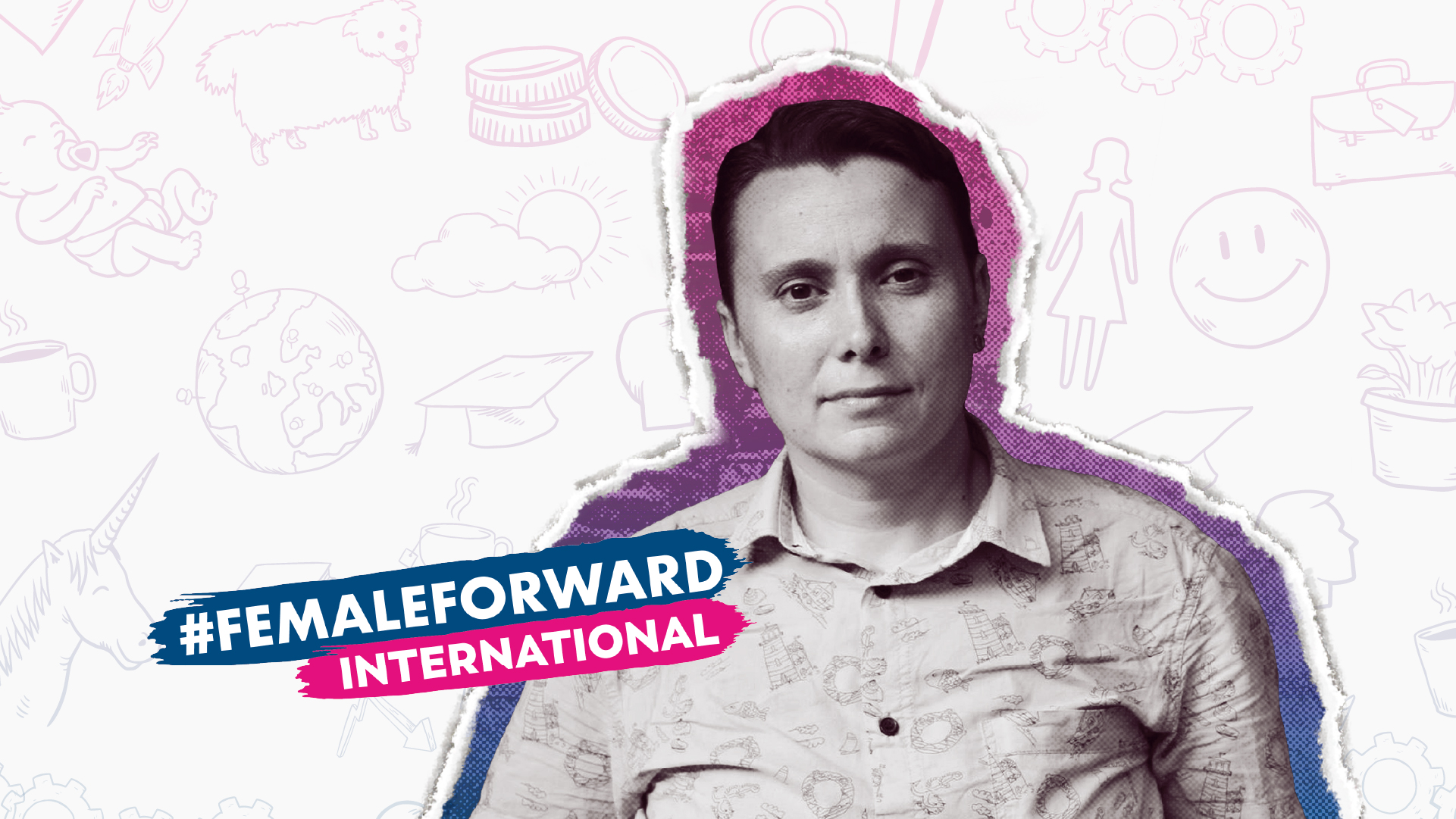
Achieving legal and social victories, Nino Bolkvadze does not wait for a better world: she creates it.
“I finally understood the meaning of the Rainbow flag. When your life blossoms and takes on new colors, your emotions become clear and sound, life fills with joy. Coming out brings struggles, of course, but they are incomparable to caving in – that’s not the solution”, says Nino Bolkvadze. She came out on national television in Georgia, a former Soviet country often presented as lying “on the intersection between Europe and Asia”, where LGBTI rights are still violently contested. Growing up between the city and the countryside, married by the age of 16 with two now grown children, a successful lawyer and a political activist, it took Nino 20 years to find acceptance. Her coming-out was a milestone of personal liberation but also a message to others – one that forever changed her, and numerous other lives, as well as the history of Geogria’s LGBTI community.
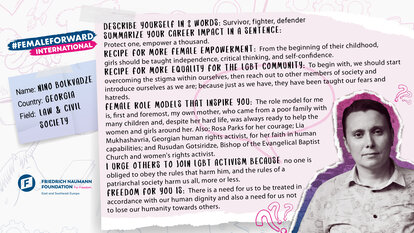
Hate as a diversion
Georgian society is still highly conservative, with religious and political powers seeking political gains by discriminating against the LGBTI community. A comparative study by the FNF foundation shows that “the severity and frequency of hate crimes against LGBTI people in Georgia remains a challenge despite the progress made in recent years”, confirming Nino’s assessment that most hate crimes towards the LGBTI community go unpunished. Abuse is not only related to far-right or hate groups; domestic and psychological violence by family members is also a persistent issue. After her televised coming-out on in 2015, Nino’s husband was ostracized because “he could not control his female family member”. Both Nino and the FNF’s assessment underscore that Georgia has sufficiently progressive legislation when it comes to human rights; it is the implementation that proves problematic.
In 2013 this divide became evident. During the International day against Homophobia, Transphobia, and Biphobia (IDAHOT) on May 17th, a peaceful LGBTI community assembly was attacked by counter-protestors. Nino was already an established lawyer at the time but had not yet come out publicly. After the violent events of what is now known as just May 17th, she realized she could not hide anymore. She divorced her husband and revealed her sexuality to her friends and family, losing some in the process, but also receiving a lot of support and meeting numerous new friends. For the first time, she belonged. It was not revenge towards the system to come out publicly on national TV in 2015. It was a revanche.
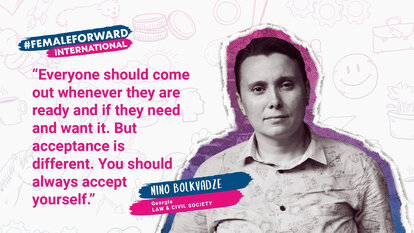
Nino is a believer in education and its ability to tear down artificially erected walls between people. But she also sees identity politics as an important factor. “I don’t want to call it a fight, since we are not fighting anybody. This is not between two sides; I don’t believe in the divide East and West. It is a question of old approaches and thinking about an issue, which leads to changing our minds and ways to match the times. In all societies, sooner or later, we will have acceptance. I don’t see it any other way. War is not a tool, war brings no good to anyone”.
Leading by example, Nino decided to run in the self-government elections on the Republican Party’s list, because the LGBTI community in Georgia has little opportunity to advocate for their rights. She was the first openly lesbian running for office in the history of Georgia. It remains difficult for the community to gain access to public forums without being bullied, discriminated against, or subjected to violence. Nino’s participation in the elections gave her a large platform to voice the problems of the community, and she also managed to present herself to the public not just as herself but as someone who shares the values of an established political party.
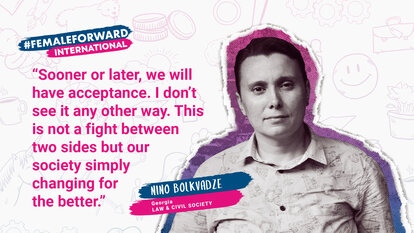
Helping others
She developed a sense of human rights already as a child when she was in the second grade. She saw the school system as compartmentalizing, trying to separate children. One time a teacher told her not to be friends with a particular girl from a poorer minority background. Nino could not obey. Her strong sense of justice and desire to help her father, whom she saw as permanently crushed by the harsh Soviet penitentiary system, led her to law school at the age of 16.
As a lawyer and an activist, Nino tirelessly supports the LGBTI cause in Georgia, giving talks in universities and creating various artistic projects, inspired by her love for reading. There are still places she dares not go, but her home village in Guria is not one of them: she is accepted by her family and visits with her partner. Sometimes life brings people together in other ways: a few years back Nino was admitted to the hospital with a thrombosis, her chances of survival unknown. Doctors recognized her, but they did not care about her sexual orientation, spending nights on end helping her. And when other patients saw her with her partner, who was taking care of her, holding her hand at her bedside, the initial shock gave way to understanding through shared experience.
“Politicians are mistaken when they think mobilization “against” something works in the long-term. Christianity has helped Georgia survive as a country, but persecution and hatred are not Christian values and will backfire. This is why reforms in education and the judiciary are necessary, the Georgian democratic scaffolding will collapse without these two pillars.”
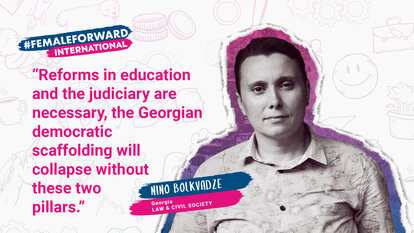
There are also rays of hope: after an attack on two lesbian couples several days before our interview took place, the Labor party issued a statement speaking out against hate crimes on the LGBTI community, an unprecedented political act. Nino also receives letters from young girls writing her that after listening to her talks and lectures, their parents accepted them. Another man recognized her on the bus and offered his unconditional support, should she ever need it. She is proud of her legal victories, which include successful cases against sexual discrimination towards women at the workplace, or discrimination against gay men in prison.
The latter case involved a young prisoner who was gay and was working at the prison while serving his sentence. For parents and relatives, a child convicted of a serious crime such as murder or rape is more acceptable than one who is a homosexual. Unofficial prison code prohibits gay inmates from touching others’ personal belongings, holding their hands, eating together and similar activities. Other prisoners told the warden that if he does not take care of “the problem”, they would have to solve it themselves. The gay prisoner was subsequently fired. Nino demanded that the court dismisses this order as illegal and discriminatory, and succeeded.
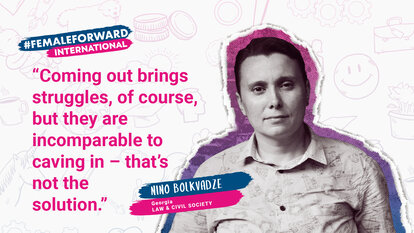
They said gay people don’t exist in Georgia
Nino also had to fight her own battles to become the woman she is today. When she was 15, she fell in love for the first time – with the new girl in class. It caused a scandal. The girl’s parents found out and moved her to a new school, while Nino had to change schools. The worst thing that could happen to a girl, in her parent’s opinion, was not something in school, not the war or the poverty ravaging Georgia at the time but failing to marry and to have children. And so, she married early in life, in denial of her true self and hoping to be “cured”.
Needless to say, her life unfolded in a different direction. She believes not everyone can or should come out – they have to do it when they are ready and prioritize safety. But acceptance is different than coming out. And a person should accept themselves no matter what. Nino is a big believer in individual action and acknowledges that Georgia has good legislation, but cases arise only if discriminated parties file a complaint. Only then lawyers like herself can defend and fight for better enforcement of human rights texts.
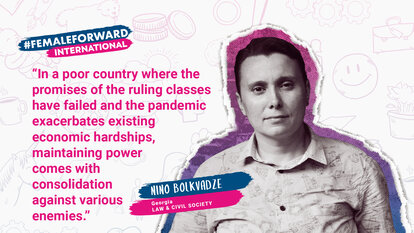
Homophobia is not the main issue – political obstacles are far more difficult to overcome. The main political forces in Georgia prevent media coverage of homophobic attacks and pander to constituents with a “traditional” rhetoric. In a poor country where the promises of the ruling classes have failed and the pandemic exacerbates existing economic hardships, maintaining power comes with consolidation against various enemies – Western values and the LGBTI community, “the cutting edge” of negative political mobilization. The fear of strangers works well psychologically as history shows: the fear of the “others” coming to steal the resources.
This identity which is used to brand and reject the community needs to be turned around to show that LGBTI people are the same as everyone else, that they are not monsters; they are first and foremost people with differing values and political tastes, so even discerning a community is sometimes difficult. But if they want their rights to be recognized, they need to mobilize around this identity. Identity politics has its own challenges, of course, but some of the strategies it provides have worked in Ukraine, an example of a homophobic country influenced by Russia and a former Soviet member, comparable to Georgia. The community is not aiming to provoke and instigate, no matter how the status quo is trying to present it. In Georgia they used to say gay people did not exist. They had rumors homosexuals were brought in from the West. A person with a different sexual orientation used to be invisible. This is why visibility is necessary, people need to come out, tell their story, have the media reflect and report on these issues.
An uphill battle
In 2019 activists saw how deep the government is entrenched in its hate politics, and how far from human rights values and European values it has led Georgian society. Alongside other organizers of the first Tbilisi Pride, Nino received threats for her life, the lives of her children and partner, and was subjected to disinformation attacks online. It was a miracle no one was injured. On June 14th Tbilisi pride activists protested against the Georgian government’s refusal to protect the community during the scheduled Pride events. Community members gathered outside of the Chancellery where they were met by far-right activists. The Pride eventually took place on July 8th 2019 with no protection for about 30 minutes, before being disbanded due to threats from representatives of far-right organizations. But Nino still considers it a success for the community. She is relentless: “Step by step we will win. We will show who we are, and we will gain more and more support.”
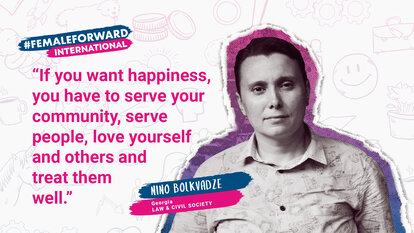
Now, for the first time in Georgia’s history, 15 political parties are signing a memorandum urging for LGBTI protection. Nino maps out three goals which she would like to reach in the future: she wants to continue advocating for liberal values in Georgia; she wants to use her professional skills in legalizing civil partnerships; and she hopes for political advocacy for the LGBTI community, who need representation.
“There are community members everywhere, in all walks of life, even in the Church. If you want happiness, you have to serve your community, serve people, love yourself and others and treat them well. And we do not have a choice, we need to speak out. It is unrealistic to wait for a flourishing democracy with no discrimination, there is no Utopia. But our own fate is in our own hands. If not us – than who else?”
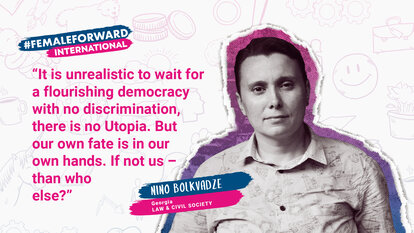
Follow more stories on female empowerment with #FemaleForwardInternational and in our Special Focus on the website.
